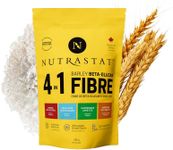Best Fiber Supplements
From leading brands and best sellers available on the web.
Metamucil
9%OFF
Metamucil Fibre Gummies, No Sugar Added, Daily Supplement, Prebiotic Plant-Based Fibre Blend, Orange Flavour, 72 Gummies

Metamucil
5%OFF
Metamucil, Daily Psyllium Husk Powder Supplement, Real Sugar, 3-in-1 Fibre for Digestive Health, Orange Smooth Flavored Drink, 72 Servings

Metamucil
17%OFF
Metamucil, Daily Psyllium Husk Powder Supplement, 3-in-1 Fibre for Digestive Health, Capsules, 160 Count

NOW
5%OFF
NOW Supplements, Psyllium Husk Caps 500 mg, Natural Soluble Fibre, Intestinal Health*, 200 Veg Capsules

RestoraLAX
5%OFF
RestoraFIBRE Daily Prebiotic Fibre Gummies - Supplements For Men And Women, Naturally Sourced Inulin, Promotes Regularity And supports Healthy Digestive system, Gentle Constipation Relief For Adults, 90 Count

Webber Naturals
21%OFF
Webber Naturals The Right Fibre4 IBS Intestinal Discomfort 195 g, Zesty Tangerine Flavour, 30 Servings, Fibre Supplement for Digestive Health, Low-FODMAP, Vegan

Pure-le Natural
Fiberrific 500g (120 servings) Prebiotic Fiber Supplement - Mixes clear, NO taste, NO texture, NEVER Thickens. Can be used in cooking and baking. Can be used in cooking and baking. Ultra Premium Digestive Supplement - No Fillers or Binders, No Artificial Ingredients

NOW
5%OFF
NOW Supplements, Whole Psyllium Husks, Non-GMO Project Verified, Soluble Fibre, 454g

Sunny Boy
Sunny Boy Foods - NutraStat high-concentration Barley Beta-Glucan soluble fiber powder for Gut and Heart Health










